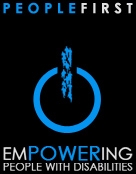The funniest man on wheels
This story begins as a nightmare. Brian Shaughnessy walked in for surgery on his spine when he was 24 years old. He never dreamed, nor was he warned by medical staff, that he might come out of the surgery paralyzed from the neck down. By the time the anesthesia wore off, Shaughnessy was a quadriplegic.
That was 27 years ago. Since then, Shaughnessy has not lived a “normal” life. He obtained a master’s in theater and a law degree. He has excelled as a student, playwright, performer, attorney, and advocate for people with disabilities. He was raised in Minnesota but now calls Hawaii home. He married a beautiful woman from China – an oncology nurse — and became a father when the couple adopted Amadeus, now 8. He became a widower when his wife died of cancer in 2007, four days after his father passed away. If tenacity was money, you’d think Shaughnessy would be bankrupt from having to fork over so much. Instead, he’s one of the most empowered people around, in or out of a wheelchair.
A couple years ago I saw Shaughnessy perform at a Minneapolis comedy club. He rolled his wheelchair up a ramp onto the theater stage wearing a black and white cow get-up. “I’m a Moo-slim,” he said by way of introduction. Many chuckled but few in the audience were accustomed to hearing stand-up from a guy sitting down. By the end of the show the chair is forgotten and so is the fact that the comic happens to be a quadriplegic.
This summer Shaughnessy is performing his one-man show “The Squeaky Wheel SQUEAKS!” for fringe festival audiences across the country. The show, like his 2005 published memoir, The Squeaky Wheel – An Unauthorized Autobiography, gives a snapshot of his life told with honesty and self-deprecating humor.
He’s currently performing at the Kansas City fringe festival through August 1, followed by performances in Minneapolis, Boulder and Chicago.
By early September he will have given about two dozen Squeaky Wheel shows.
“I do it to tell cripple jokes, to allow a ‘cripple’ to joke and… its pitch black,” says Shaughnessy. “I like the feedback and the challenge. I also may get seen by the guy who’ll make the movie.”
Shaughnessy dedicates a portion of the sales of his book to the Open Door Foundation. The foundation provides legal assistance through the Disability Rights Legal Center and artistic opportunities through VSA (The International Organization on Arts and Disability) Minnesota. He also co-founded the Open Door Theater in Minnesota – a theater by, for and about persons with disabilities.
Brian Shaughnessy performs his one man show The Squeaky Wheel SQUEAKS! at these summer Fringe Festivals:
July 9-17 Washington, DC
July 23-Aug 1: Kansas City
Aug 5-15: Minneapolis - St. Paul
Aug 18-29: Boulder
Excerpts from DC Theatre Scene review of “The Squeaky Wheel SQUEAKS!”, July 11, 2010
“Brian Shaugnessy is a Hawaii-based author and playwright and boy does his squeaky wheelchair squeak and also spark – striking a thousand points of hopeful light both on stage, from the printed page, and in person afterwards over an impromptu late lunch as well.”
“Minnesota-born and 52 years old this year, he is also an actor and director, attorney and entrepreneur, widower and father, and quite possibly the funniest man on wheels.”
“By all means, see this show for its simple and un adorned first-person story-telling, a soliloquy from the soul. It is tearful and funny, minus any sentimental back-patting. I consider it a “must see.”’
